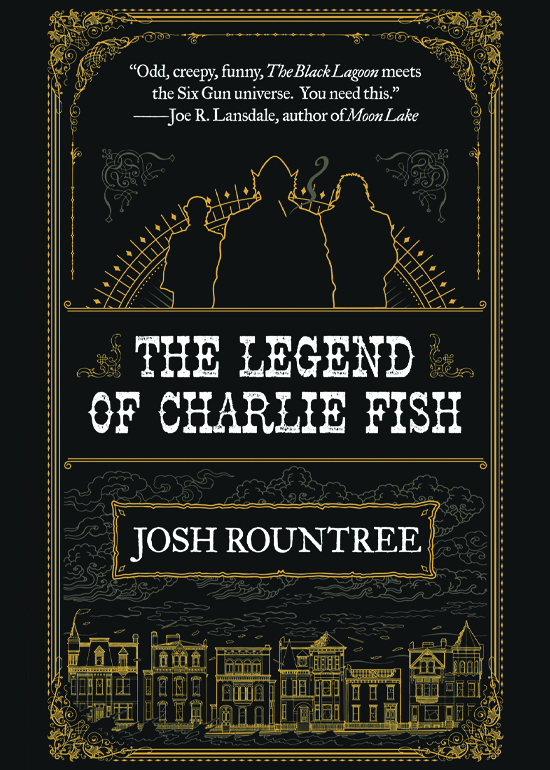Amazing! Startling! Shocking!

The Legend of Charlie Fish
by Josh Rountree
San Francisco: Tachyon Publications, 2023.
192 pp. $16.95 Paperback.
Reviewed by
Jake St. Angelo
Josh Rountree stages Galveston, Texas, as the crossroads between genres in his debut novel, The Legend of Charlie Fish. With iconic figures of American Gothic stories such as witches and fish-men, Rountree merges New England folklore with the western, set amid a real Texas tragedy that marks the end of the area’s nineteenth century ideals. Combining gothic, puritanical horror with western caricatures leads to a comedic tonal juxtaposition, which makes it hard to form attachments to key characters. While this novel suffers from confusing switches in narrators, its imagery and powerful ending compose a beautiful homage to cities off the Gulf Coast, which grow their history and culture under looming possibility of catastrophic natural disaster.
Fans of classic monsters will recognize the gill-man silhouette of Charlie Fish from various sources, such as The Creature from the Black Lagoon or H. P. Lovecraft’s “The Shadow over Innsmouth.” In The Legend of Charlie Fish, the titular character is saved by Nellie, a psychic little girl and narrator for half of the story. These psychic abilities lead to some of the most beautiful scenes in the novel, where characters become lost in psionic exploration of memories and emotions, and the otherwise grounded imagery gets swept away by sea-stream currents of Charlie’s underwater home, to use a specifically memorable example.
The fusion of those elements of American horror to the classic western are seen with characters such as the snake-oil charlatan, Professor Finn, and Nellie’s gunslinging younger brother Hank. With these characters, one sees the tone of the novel jumping to cartoonish stereotypes. Everyone loves a hero gunslinger, with impeccable aim and a penchant for quippy one-liners, but when that hardened killer is portrayed as a nine-year-old, it’s hard to take the world he exists in seriously. Normally portrayed as skittish and dependent on his older sister and the adults who begin to care for him, Hank realizes his strength only when he’s shooting things, making him appear as a bloodthirsty maniac.
Though there are some tonal issues, the ending is incredibly tense. Seeds that the hurricane will hit Galveston are planted throughout, but unless you are familiar with “The Great Storm,” you might have believed that the city would be able to take the weather in stride along with the characters who downplayed its severity. The feeling of how devastating the storm was, and the feelings of chaos and hopelessness presented by Rountree in this final act work as a torrential backdrop to the already climactic events the characters are going through, presented in a manner reminiscent of other instances of stories about storms from the Gulf, such as Zora Neale Hurston’s Their Eyes Were Watching God. Ending the narrative with the most devastating natural tragedy in Texas set a definitive tone to the novel.
The trauma of The Great Storm brought the need to rebuild to the characters in Galveston. This ending solidifies the story. The elements of the American genres referenced throughout are love letters, not just to those genres but to Texas itself. And Galveston, the emerald jewel of the story, is sacrificed and reborn for the twentieth century by the end of the novel. The author’s note following the story, regarding the historical relevance of Galveston and The Great Storm, is a clear indication of Rountree’s knowledge of and love for the city. If you are someone who loves American literature, history, and Texas, then The Legend of Charlie Fish delivers a fun found-family story that tributes and draws in all those elements.
Jake St. Angelo is a first-year graduate student studying Literature at Texas State University. He received his bachelor's degree in English from Sam Houston State University with a minor in Creative Writing.
